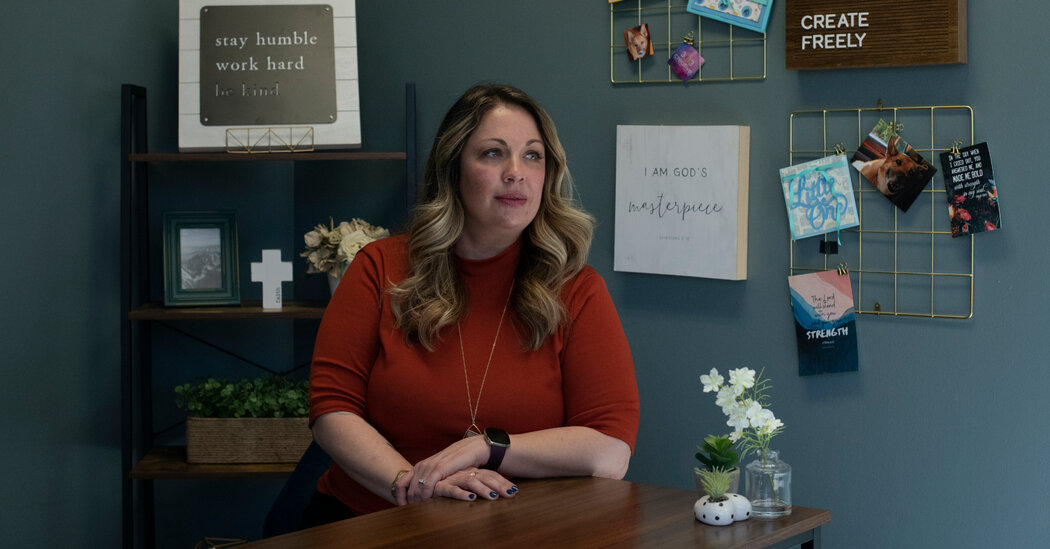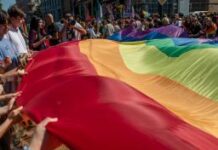
LITTLETON, Colo. — Ten years ago, a Colorado baker named Jack Phillips turned away a gay couple who had asked him for a wedding cake, saying that a state law forbidding discrimination based on sexual orientation must yield to his faith.
The dispute, a white-hot flash point in the culture wars, made it to the Supreme Court. But Justice Anthony M. Kennedy’s narrow majority opinion in 2018 did not settle the question of whether the First Amendment permits discrimination by businesses open to the public based on their owners’ religious convictions. Indeed, the opinion acknowledged that the court had merely kicked the can down the road and would have to decide “some future controversy involving facts similar to these.”
That controversy has now arrived, and the facts are indeed similar. A graphic designer named Lorie Smith, who works just a few miles from Mr. Phillips’s bakery, Masterpiece Cakeshop, has challenged the same Colorado law on the same grounds.
“He’s an artist,” Ms. Smith said of Mr. Phillips. “I’m also an artist. We shouldn’t be punished for creating consistently with our convictions.”
The basic arguments in the case, which will be made before the Supreme Court on Monday, are as familiar as they are polarizing.
On one side are people who say the government should not force them to violate their principles to make a living. On the other are same-sex couples and others who say they are entitled to equal treatment from businesses open to the public.
Both sides say that the consequences of the court’s ruling could be enormous, though for different reasons. Ms. Smith’s supporters say a ruling for the state would allow the government to force all sorts of artists to state things at odds with their beliefs. Her opponents say a ruling in her favor would blow a hole through anti-discrimination laws and allow businesses engaged in expression to refuse service to, say, Black people or Muslims based on odious but sincerely held convictions.
The court that will hear those arguments has been transformed since the 2018 decision. After Justice Kennedy’s retirement later that year and Justice Ruth Bader Ginsburg’s death in 2020, the Supreme Court has shifted to the right and been exceptionally receptive to claims of religious freedom.
Moreover, when the Supreme Court overturned Roe v. Wade in June, Justice Clarence Thomas filed a concurring opinion calling for the elimination of the right to same-sex marriage. Supporters of gay rights fear that a ruling for Ms. Smith will undermine that right, marking the marriages of same-sex couples as second-class unions unworthy of legal protection.
The court had earlier opportunities to revisit the larger issues in the Masterpiece Cakeshop case, but it rejected appeals from a florist in Washington State and the owners of a bakery in Oregon who said they should not be required to create works for same-sex unions.
Understand the U.S. Supreme Court’s New Term
The decision to hear Ms. Smith’s case was probably driven by several factors: an increasingly assertive six-justice conservative supermajority, a sense that Ms. Smith’s designs were more likely to be expression protected by the First Amendment and the desire of at least some justices to undo or limit Obergefell v. Hodges, the 2015 decision establishing a right to same-sex marriage.
Ms. Smith, in an interview in her modest but cheerful studio in an office building in a suburb of Denver, sat near a plaque that echoed a Bible verse: “I am God’s masterpiece.” She said she was happy to create graphics and websites for anyone, including L.G.B.T.Q. people. But her Christian faith, she said, did not allow her to create messages celebrating same-sex marriages.
“When I chose to start my own business as an artist to create custom expression,” she said, “I did not surrender my First Amendment rights.”
Phil Weiser, Colorado’s attorney general, countered that there is no constitutional right to discriminate. “Once you open up your doors to the public, you have to serve everybody,” he said. “You can’t turn people away based on who they are.”
The court decided Masterpiece Cakeshop on an idiosyncratic ground that is not at issue in the new case, 303 Creative v. Elenis, No. 21-476. Justice Kennedy, writing for the majority in 2018, said Mr. Phillips had been treated unfairly by members of a civil rights commission who had made comments hostile to religion.
Mr. Phillips’s limited victory left unresolved whether he has a constitutional right to refuse to create custom cakes for L.G.B.T.Q. people. Indeed, a Colorado appeals court recently heard arguments in his appeal of a ruling against him in a case brought by a transgender woman.
In the Supreme Court, Mr. Phillips had pursued claims based on his rights to the free exercise of religion and the freedom of speech. Ms. Smith also asked the Supreme Court to consider both of those grounds, but the justices agreed to decide only “whether applying a public-accommodation law to compel an artist to speak or stay silent violates the free speech clause of the First Amendment.”
Both Mr. Phillips and Ms. Smith are represented by Alliance Defending Freedom, a conservative Christian law firm and advocacy group that has litigated many cases for clients opposed to abortion, contraception coverage, and gay and transgender rights.
Mr. Weiser, Colorado’s attorney general, said there was an important difference between the Masterpiece Cakeshop case and the new one. Mr. Phillips refused to serve an actual couple, David Mullins and Charlie Craig, who filed civil rights charges, saying they had been demeaned and humiliated. The details of the encounter, he said, mattered in assessing the legal issues.
Ms. Smith, by contrast, sued before facing any punishment.
“This is a made-up case,” Mr. Weiser said. “There haven’t been any websites that have been made for a wedding. There hasn’t been anyone turned away. We’re in a world of pure hypotheticals.”
Ms. Smith countered that she should not have to have to risk fines for exercising her rights.
“If I continue creating for weddings consistent with my beliefs, the State of Colorado intends to fully come after me,” she said. “Rather than wait to be punished, I decided to take a stand to protect my First Amendment rights. I shouldn’t have to be punished before I challenge an unjust law.”
The two Colorado cases differ in another way, at least in the eyes of some legal scholars, notably Dale Carpenter, a law professor at Southern Methodist University. In the Masterpiece Cakeshop case, Professor Carpenter filed a brief supporting the gay couple along with Eugene Volokh of the University of California, Los Angeles.
But in the new case, they took Ms. Smith’s side. Professor Carpenter did so, he explained in an interview, in part because he has devoted his career to the cause of advancing gay rights.
More on the U.S. Supreme Court
“It seems to me that the freedom of speech has been essential to the cause of L.G.B.T. rights,” he said. “It could not have advanced without the freedoms that are secured by the First Amendment. I take these things to go hand in hand.”
Mr. Phillips’s cakes did not deserve First Amendment protection, Professor Carpenter added, but Ms. Smith’s graphics and websites do.
“Cake making is neither an inherently expressive nor a traditionally expressive medium,” Professor Carpenter said. “People make cakes for taste or nutrition.”
Ms. Smith’s design work was different, he said. It involved, he said, “activities that are inherently expressive, including through the usual mediums of communication like writing or speaking.”
Kristen K. Waggoner, a lawyer with Alliance Defending Freedom, agreed that the two cases were different.
“This is an easier case than Masterpiece,” she said. “Here we have pure speech.”
David D. Cole, the legal director of the American Civil Liberties Union, who represented the couple in Masterpiece Cakeshop, said that was not the point. So long as Ms. Smith’s company was open to the public and selling a given service, he said, it must abide by state anti-discrimination laws.
A ruling in favor of Ms. Smith and her company, 303 Creative, would have devastating consequences, Mr. Cole said.
“If 303 Creative wins here, we will live in a world in which any business that has an expressive service can put up a sign that says ‘Women Not Served, Jews Not Served, Black People Not Served,’ and claim a First Amendment right to do so,” he said. “I don’t think any of us want to live in that world, and I don’t think the First Amendment requires us to live in that world.”
A divided three-judge panel of the U.S. Court of Appeals for the 10th Circuit, in Denver, ruled against Ms. Smith even as it accepted most of her arguments.
“Creation of wedding websites is pure speech,” Judge Mary Beck Briscoe wrote for the majority, and the Colorado anti-discrimination law compels Ms. Smith and her company “to create custom websites they otherwise would not.”
That meant, Judge Briscoe wrote, that the anti-discrimination law had to survive the most demanding form of judicial scrutiny, one requiring the state to demonstrate a compelling interest and to show that the law was narrowly tailored to address that interest. Judge Briscoe said Colorado had proved both.
“Colorado has a compelling interest in protecting both the dignity interests of members of marginalized groups and their material interests in accessing the commercial marketplace,” Judge Briscoe wrote.
In dissent, Chief Judge Timothy M. Tymkovich said “the majority takes the remarkable — and novel — stance that the government may force Ms. Smith to produce messages that violate her conscience.”
“It seems we have moved from ‘live and let live,’” he wrote, “to ‘you can’t say that.’”







